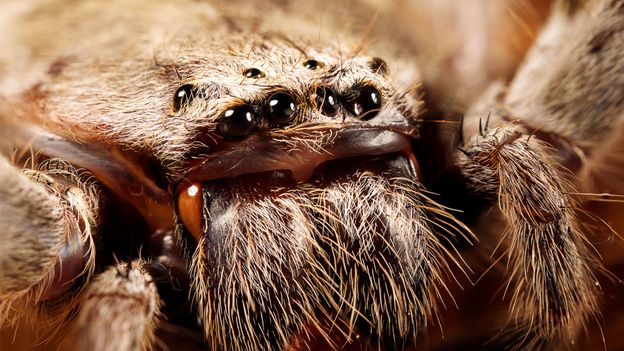
With their tiny, beady eyes, spiders fall into this category – to our flawed ape-brains, they have a decidedly un-cute adult appearance, to which we ascribe off-putting qualities such as being less kind, trustworthy and warm. In contrast, those few spider species that have larger eyes are generally seen as less frightening.
One example is jumping spiders, which have two main doe-eyes, with their extra pairs hidden towards the backs of their heads. They’re so likeable that the researchers of one paper described them as “gateway spiders” – useful ambassadors for their less wholesome relatives. They’ve already starred in a number of viral videos, which set their endearingly silly mating dances to songs like the YMCA.
A flawed hierarchy
Regardless of why we view spiders as a disposable nuisance, there are plenty of arguments for treating their lives with more respect – and psychological tricks for helping us to do so.
One is to anthropomorphise spiders as much as possible, to hijack the brain’s natural compassion for other members of our species – a method which has been suggested as a way to get the public to engage more with the conservation of endangered animals (which, incidentally, many arachnids are). This can be achieved by depicting spiders with more human-like physical features, giving them relatable personalities, emotions and genders – “look, she’s so cross!” – and focusing on our similarities rather than differences.
However, there’s also an opposing school of thought: since empathy is so deeply flawed, we should try to avoid using it as the basis for our moral decisions altogether.
Instead, we could ascribe spider lives with value based on rational calculations – such as their function within an ecosystem. So we could try reminding ourselves that arachnids kill around 400-800 million tons (363-726 tonnes) of prey each year, and in doing so help to keep certain insect populations in check, including those that cause disease in humans.
Alternatively, we could avoid killing spiders because of their abilities and biology – arming ourselves with facts about the ingenuity of their brains, which are capable of remarkably complex decision-making, though they’re tens of thousands of times smaller than those of mammals.
But there’s also another way.
“I think people assume that some forms of life are worth more than others… but they don’t think about it. They don’t ask themselves those questions,” says Geraldine Wright, professor of entomology at the University of Oxford. She points out that our disregard for spiders is partly a Western peculiarity, since some cultures and religions – such as Buddhism – have held the view that all living things are precious for millennia.
However, some experts are hopeful that we are gradually becoming more accepting of spiders and insects – especially as people start to think more about biodiversity and environmental conservation. “The other change is the idea that each individual has an intrinsic value, and you shouldn’t just kill it for the sake of it,” says Donald Broom, emeritus professor of animal welfare at the University of Cambridge.
Just as I was writing this article, I noticed a new Stripy setting themselves up in my garden – perhaps one of my old friend’s descendants. I think I’ll leave them to it, whether I like them or not.
Zaria Gorvett is a senior journalist for BBC Future and tweets @ZariaGorvett
—
Join one million Future fans by liking us on Facebook, or follow us on Twitter or Instagram.
If you liked this story, sign up for the weekly bbc.com features newsletter, called “The Essential List”. A handpicked selection of stories from BBC Future, Culture, Worklife, Travel and Reel delivered to your inbox every Friday.
from WordPress https://ift.tt/3uJJUib
via IFTTT

No comments:
Post a Comment